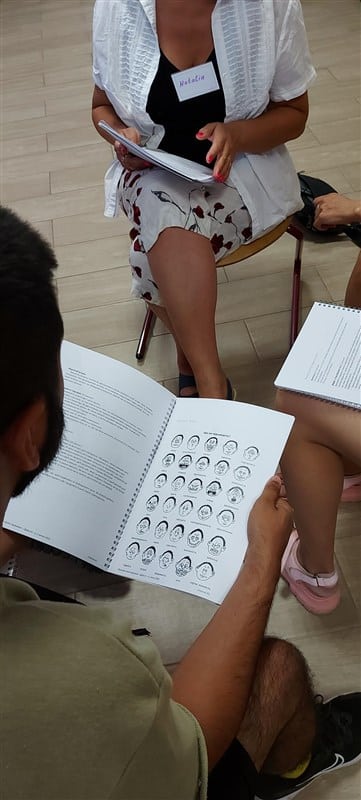Investing in mental health
Why Dorcas considers mental well-being to be a priority
Poverty, disaster and violence impact communities and countries worldwide and have a devastating impact on millions of people’s mental health and psychosocial well-being. Yet humanitarian assistance often just focuses on providing tangible health services, food and shelter. In this article, Dorcas argues why mental health and psychological support (MHPSS) should also be an integral component of both short- and long-term humanitarian assistance.
The importance of mental well-being
Evidence has consistently shown that people with mental illness have greater physical health morbidity and mortality compared to the general population. Heleen Berends, Humanitarian Assistance Expert at Dorcas Ukraine, explains how mental health issues in a conflict situation affect people’s resilience and ability to cope. ‘For example, a few months after the war in Ukraine started, we noticed that teenagers and young adults were having such a hard time. Especially those who had fled from the contact lines. Suddenly they were without school or work, experienced uncertainty about their future and lacked a purpose in their lives. On top of that, they had experienced traumatic events, such as life-threatening bombing, having to leave home and losing loved ones. One of the awful consequences of losing hope like this is an increase in the suicide rate.’
Likewise, millions of other people around the world are confronted with a whole range of mental health issues. Without sufficient support, people can experience long-term or recurring setbacks. This can lead to more serious mental health complaints such as anxiety, depression and (post) traumatic stress that can have a negative impact on a person’s ability to work, earn an income or care for their children, for example. Therefore prevention and early treatment are much better than cure when it comes to mental health.
Dorcas’ approach
Dorcas has a long track record with MHPSS in humanitarian assistance, especially in Lebanon and Syria. Our MHPSS programmes aim to protect or promote psychosocial well-being and prevent or treat mental health complaints. We offer individual therapy, group sessions and creative approaches. Our focus is primarily on people with specific needs, such as older people, children, minority groups and people with disabilities.
MHPSS is integrated into all existing programmes of Dorcas. For example:
- On an individual level, Dorcas provides food security, shelter, clean water, medication (for mental health treatments) and cash programmes. We also support people with referrals to specialised support services.
- On a community level, Dorcas is active in awareness raising, supportive parenting programmes, group sessions, educational activities, livelihood activities, community safety nets for older people, self-help groups for women, youth clubs, life skills activities and supporting (self-) employment opportunities. We also have mobile teams (therapists) that reach out to the community.
- On a society level, Dorcas advocates for the rights of marginalised groups and access to (mental) health care and social services.

Removing the stigmas associated with mental health issues
An important part of our approach is removing the stigmas associated with mental health issues. We see how many individuals are hesitant to seek help as they might face stigma. This applies to both very severe traumas (for example, due to sexual violence) and minor traumas (for example, when a child has seen its parents in a panic). Social and cultural beliefs regarding mental health cause a lot of preconceptions. The long-used community-based approach of Dorcas provides a solution to this challenge. Heleen: ‘In our group sessions, the participants share experiences, connect with each other, recognise similar mental health issues, and learn that these are a normal reaction to an abnormal situation. This is how the social cohesion – including mutual trust – that has often been damaged is restored again.’
Example from Yemen
Yemen is facing the largest humanitarian crisis worldwide with ongoing armed conflict, displacement, depleted health delivery systems, a fuel and economic crisis, and a shortage of humanitarian funding. In Yemen, mental health and psychosocial support is underfunded and lacks prioritisation. The population of Yemen lives in extreme poverty and with high fragility. These years of conflict, displacement and emotional distress after traumatic experiences cause a wide range of mental health issues and chronic stress for both adults and children.
Adriaan Jagersma, interim Country Director in Yemen, explains: ‘War brings all kinds of trauma, especially in Yemen where thousands of children have starved to death and many people live in refugee camps and have experienced rocket attacks. All these things take their mental toll. At the same time, we also see a lot of resilience and a great desire to look beyond this crisis. So when we are looking for ways to support people in rebuilding their lives, one of the most important questions to ask is simply: how do you feel? How can we support you in finding hope, confidence and motivation again?’
Staff care
Humanitarian staff may experience direct or indirect exposure to trauma and therefore many stressors in their work. An increased risk for burnout and depression is seen among local and international humanitarian workers. As an employer, Dorcas ensures that all staff have access to supportive tools so that they are self-aware, find a healthy work-life balance and can process intense emotional experiences. This also applies to staff working in situations of extreme and chronic poverty.
In conclusion, mental health is a critical emergency health tool and protection intervention for everyone involved in humanitarian work and development. It is crucial to the overall well-being, functioning and resilience of individual project participants and staff, as well as communities and societies recovering from emergencies and poverty. Dorcas invests in professionals with sufficient psychological knowledge and experience. We believe this is an essential part of structural recovery after poverty, disaster and violence.
10 October 2022
Are you inspired?
Read the next story or contact us to get to know more about making an impact together.